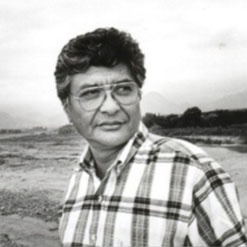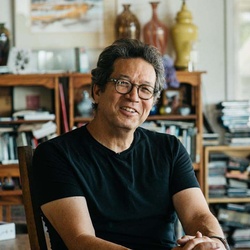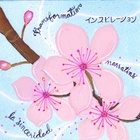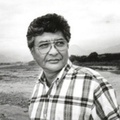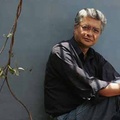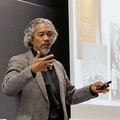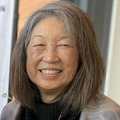This month, we are greatly honored to present a poem by renowned and beloved Peruvian poet, the late José Watanabe. In turn, his poetry here honors the 75th birthday of his mama and the indelible impact of mothers. The wonderful translation for the poem is provided by Michelle Har Kim. Joining Mr. Watanabe is a pair of poetic fragments from another the Los Angeles-based and another literary treasure, Sesshu Foster. To have two renowned Nikkei Latino writers published together in this column is something I’ve been very excited to do for quite some time now. Enjoy.
— traci kato-kiriyama
* * * * *
The late José Watanabe (1946-2007) is one of Peru’s most beloved contemporary poets. Along with his numerous articles, children’s books and screenplays, the author's publications feature seven original volumes of poetry. Watanabe is also a main contributor to La memoria del ojo: cien años de presencia japonesa en el Perú (Memory of the Eye: A Hundred Years of Japanese Presence in Peru, 1999), a riveting “photographic history” that narrates scenes of everyday life, loss, and northward “relocation” of approximately 1800 Japanese Peruvians to U.S. detention camps during World War II. The poem “Mama Turns 75” is excerpted from the maestro's third book of poems, Historia natural (Natural History, 1994).
Mama Turns 75
Five cuyes have fallen
slaughtered, in sacrifice, at your aged queen’s feet.
Blood always celebrates your birthday, receive it
in a bowl
where it may congeal into a brilliant sign
as it can on the blade.
The light bulb coincides with your sleeping head
and exalts you: We begin loving you
with certain piety,
but your eyes
your eyes open quickly as if forewarned, reviving in them
an animal of harshest tenderness.
Your eyes enfolded in skin
are the unscathed remainder
of the main character you were among us,
when upright and tall
you would stretch the lamp into the darkness
calling out in whispers
to no one. The shadows at the wall and the cats
beyond the awful border
were innocent. You, Señora, were the fear.
Soon five cuyes will be served at the table.
Others were for the rite of healing, of exposed and sentient entrails
that revealed our illnesses.
These are for the tooth, our prey. They won’t say
that you are our oldest affliction.
* This poem is copyrighted by José Watanabe (1994) and English translation was originally published on The Asian American Literary Review 8.1 (2017).
* * * * *
Sesshu Foster has taught in East L.A. for 30 years. His work has been published in The Oxford Anthology of Modern American Poetry, Language for a New Century: Poetry from the Middle East, Asia and Beyond, and BAX: Best American Experimental Writing. Winner of two American Book Awards, his most recent books are the chapbook, Praying Mantis (Business Bear Press, 2017) and the hybrid City of the Future (Kaya Press, 2018). He’s collaborating on a novel (forthcoming from City Lights in 2019), The East Los Angeles Dirigible Air Transport Lines, a History, with artist Arturo Romo.
South Pasadena Postcard
I slid the check under the inch and a half thick bullet-proof acrylic. I didn’t look directly at the bank teller till she asked me if I was really the father of her best friend in second grade. Yes, that’s right! I said, looking at her finally, and I asked about her younger brother and sister. As it happens, her name slipped my mind for the moment. I told her, “You lightened your hair! It used to be dark.” That’s right, she said. She asked about my daughter, and we caught up a little as she processed my transaction. We took a a while to chat—she still lives on Elm Street. Neither of us mentioned the event that changed their lives and set in motion the events that separated her from my daughter, her mom’s death in an SUV rollover in Texas. She said she wished to get in touch with my daughter and I assured her that I would relay the message. “It’s great to see you,” I said. I didn’t say that her mom had been a wonderful person, full of sweetness and laughter. I didn’t tell her now that she’d lightened her hair, she’d given herself her mom’s color.
* This was originally published in City of the Future (2018, Los Angeles: Kaya Press) and copyrighted by Sesshu Foster.
Dad Postcard
Sometimes I go back when Dad was young, and I’m hipper than him, meaner, stronger---though he’s quick, always strong. Veteran of N. Africa (Signal Corps), collegiate boxer and drop-out. I know about him, know how terrible his whole life turns. He’ll try to ruin the lives of three wives. Before all that, a good looking fresh-faced kid, open face, gentle eyes---even if later, when everything is ruined, there’s only one thing in the world for his shame. I scoff, knowing in advance how he’ll treat mom. A good guy, too---that’s his problem (everyone can see he’s a good guy, they know it)---an innocent to his own capacity for self-betrayal. A genuine innocence that will destroy lives, it shall hang on his face like dead skin. He can’t understand why a stranger like me would look upon him with this hatred (he just feels it in the air). He’s only been open and friendly with everyone. What could anyone have against him? (Perhaps a shadow of a suspicion.) Do I wish him destroyed? What good would that do? His life will flash by like a piece of paper in a fire. I’m just a face---like a shadow---amongst his friends. He was outgoing---especially with a beer in hand. So thirsty! Barely aware of me, floating like a headache in Joe’s Bar, lower State Street, Santa Barbara. Then I’m gone. His son (sent to fetch his dad, before he drinks up all the food money) comes in off the street. Amongst the men, Dad points, gestures at the boy. “That’s my son,” he grins.
* This is copyrighted by Sesshu Foster (2018).
©1994 José Watanabe / © 2018 Sesshu Foster




